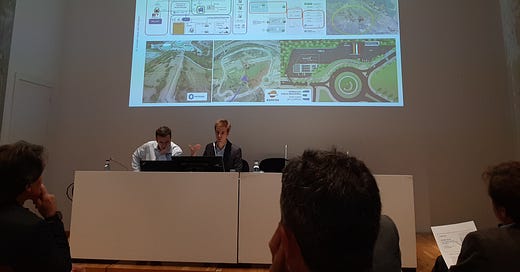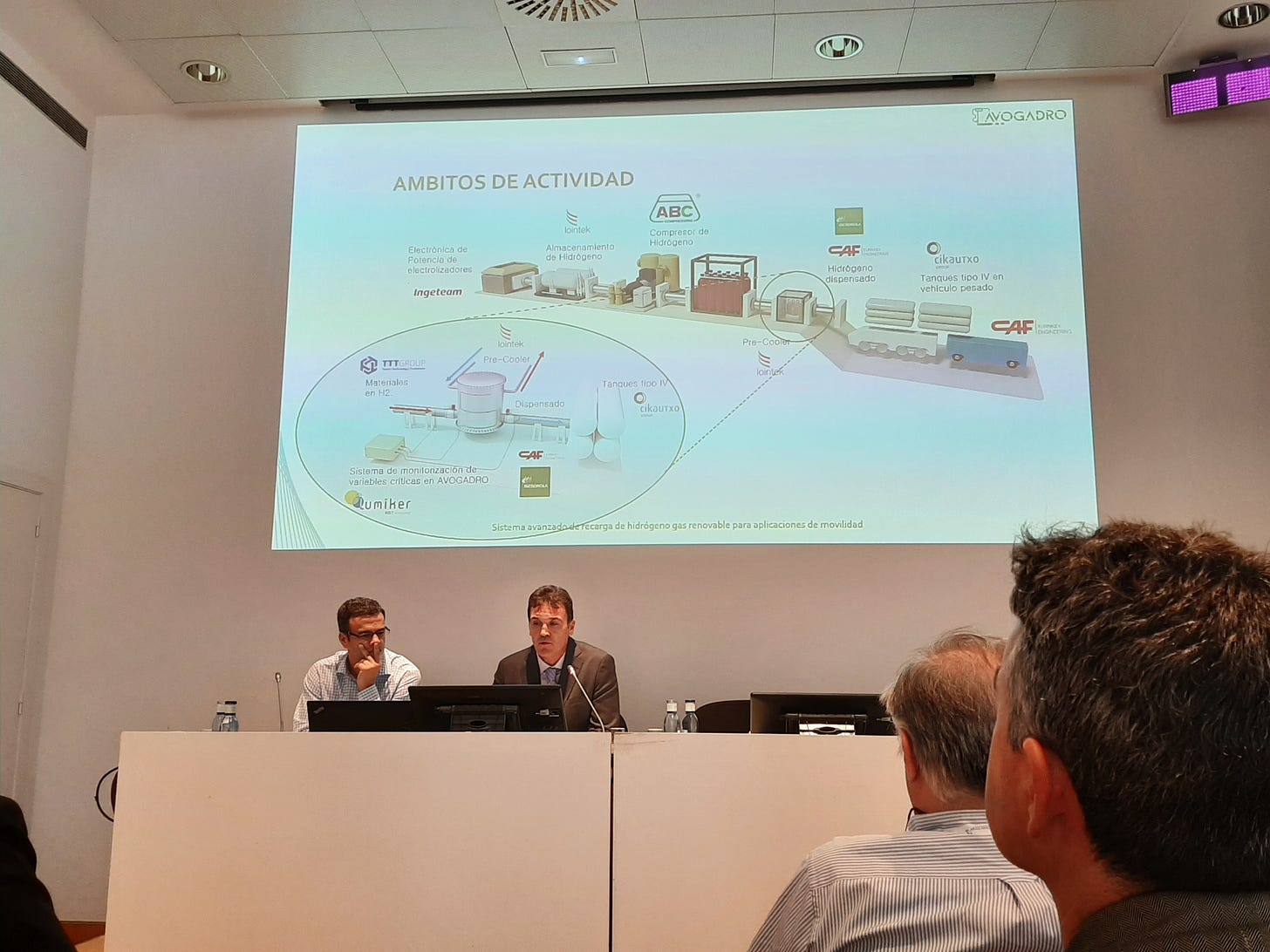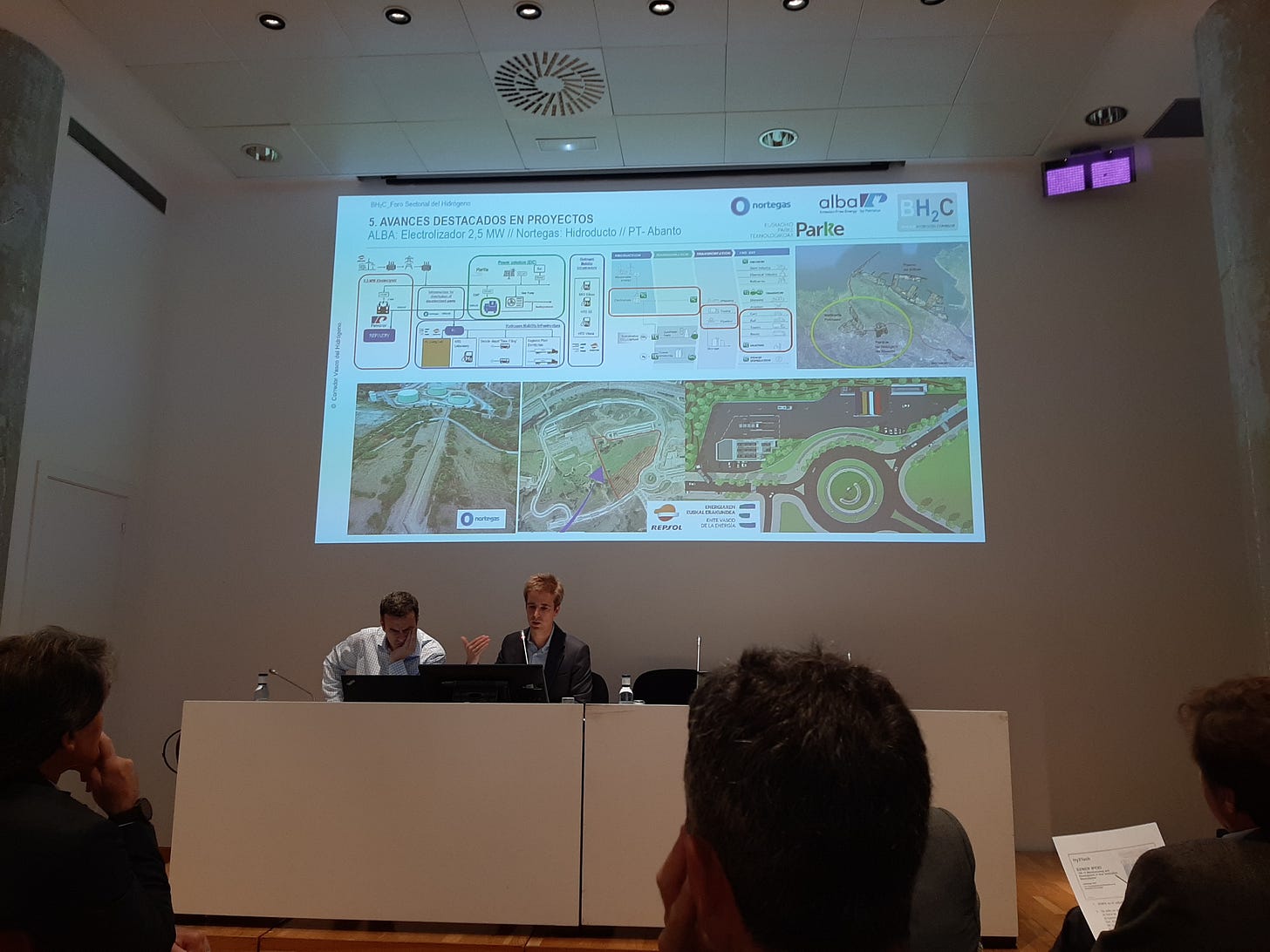48/49) Foro Sectorial de Hidrógeno - 27 de octubre 2022
En primer lugar, Arturo Fernández Goyenechea de Petronor ha enumerado los avances más significativos dentro del Corredor Vasco de Hidrógeno, mencionando el Corredor de H₂ del Ebro, la Comunidad de Trabajo de los Pirineos (CTP) y el Basque Net Zero Industrial Super Cluster (donde se tiene la intención de descarbonizar 8,2MTn CO₂/año que emite la región).
De cara al primer electrolizador de 2,5MW, instalado en el País Vasco situado en la refinería de Muskiz, el comisionado esta previsto para marzo y la puesta en marcha en abril de 2023. No obstante, cabe mencionar que Nortegas tiene enterrado el hidroducto de 1860m que conecta Petronor y el EIC (más información aquí https://lnkd.in/eAPFMc6M).
Felicitar al BH2C asociación, ya que ha sido el ganador de la primera edición del “European H₂ Valley of the year 2022” organizado por La Asociación del Hidrógeno Limpio de Europa. La verdad que es un gran reconocimiento, logrado gracias a la buena visión y al trabajo duro de estos dos últimos años. Zorionak!
Tras las dos oleadas de los IPCEIs resueltas, donde se han premiado, por una parte, el electrolizador de 100MW a Petronor-Repsol, y por otra parte, a Sener por su proyecto intensivo en I+D (+50% de la financiación destinada a I+D) sobre desarrollo y producción de nuevos electrolizadores, entre otros. Telmo Chavarri ha dado unas pequeñas pinceladas sobre los paquetes de trabajo que están previstos: a corto plazo con electrolizadores de tecnología alcalina, donde entra desde el stack, BoP, digitalización…y a largo plazo, con el desarrollo tecnológico de electrolizadores de tecnología aniónica.
Jose Ignacio Hormaeche del Cluster de Energia ha hecho balance de encuentros y actividades del Foro Sectorial del Hidrógeno 2021-2022, destacando las 44 ponencias y 17 presentaciones pitch que se han materializado durante las 6 reuniones que se han llevado a cabo desde el primer trimestre del 2021.
Alberto Diaz de Deloitte ha revisado los aspectos regulatorios y próximas convocatorias de ayudas del PERTE. El RePowerEU responde a dificultades y perturbaciones del mercado mundial energético, y para ello se han adoptado algunas medidas a corto plazo, como son la compra común de gas e hidrogeno en una plataforma conjunta, o la aprobación de los primeros proyectos de hidrogeno a escala de UE.
A medio-largo plazo (2017-2030) se ha establecido el aumento del uso de la energía renovable del 40 al 45% y análogamente, aumentar la eficiencia energética del 9 al 13% y la producción autóctona H₂ con electrolisis de 40GW a 65GW a 2030.
Finalmente, también ha mencionado que de los 300.000M€ de los Fondos de reconstrucción (25% irán en subvenciones y 75% en préstamos blandos). Por último, que de los 1555M€, aun quedan sin asignar 960M€… vamos tarde; y se prevé la creación de un Cluster de H₂ renovable nacional.
Ekain fernandez de Tecnalia ha descrito el estado actual y perspectivas de la tecnologías de portadores líquidos de hidrógeno. Los LOCH son compuestos orgánicos que pueden absorber y desorber cíclicamente H₂, siendo un proceso compatible con la infraestructura actual y con éxito demostrado a pequeña escala. Ha mencionado el proyecto que conecta Brunei con Japón mediante Metilciclohexano – Tolueno, y el de Hydrogenius con el perhydrodibenziltolueno- Dibenzil tolueno.
Entre los objetivos que se buscan son capacidad de almacenamiento de H2> 6.5%en peso, bajo coste, no toxico, densidad energética >1.7kWh/L. Tecnalia Hydrogen Technology ha presentado el proyecto EkarriH2 (Elkartek 2022) donde pretende desarrollar un portador innovador de hidrógeno basado en líquidos iónicos y al menos 2 prototipos de reactores de Hidrogenación/Deshidrogenación.
Iñaki Gutierrez de Zwick Roell ha explicado que debido a los problemas de fragilización que ocurre en la estructura del acero en presencia del H₂, solo existen dos soluciones: desarrollar nuevo materiales o una capa de polímero en la superficie entre el acero y H₂. Han exhibido como pueden caracterizar los materiales de las tecnologías de H₂ mediante ensayos de alto rendimiento (ambientes corrosivos, altas temperaturas, altas presiones).
Juan Villar de Nortegas ha centrado su intervención en el proyecto estratégico H2SAREA (https://lnkd.in/e7Wgyr7m), donde ha remarcado que el futuro de la compañía por la parte técnica pasa por el H₂ renovable, gas natural sintético, biometano (con capacidad hasta 130 TWh siendo 30-40% del gas), la eficiencia energética y los contadores inteligentes.
Ha resaltado que las líneas 100% dedicadas al hidrógeno garantizarían una seguridad de suministro mediante una red mallada y accesible a nuestro tejido industrial. Dentro de H2SAREA se va estudiar el blending para dos usos industriales como son las calderas de vapor en Smurfit, y un horno de tratamiento térmico en Fagor.
Jordi Gutiérrez de Iberdrola ha presentado el proyecto Avogadro, donde se pretende desarrollar la tecnología en hidrolineras para transporte pesado (vehículos de 350 bar) y ferrocarril para alcanzar altas prestaciones. Este proyecto de 5,7M€ es un Hazitek 2022 que están involucrados entre otros CAF, Ingeteam, ABC, Cikautxo, Lumiker, TTT Group. Entre la investigación a realizar se pretende conseguir know-how para lograr: Consumo energético reducidos de 2 kWh/kg, disponibilidad elevada 99%, CAPEX optimizado para 350 bar a 2000€ (kg/día) y costes de mantenimiento anual reducido de 0,15€/kg.
Gorka Plata de Mondragon Unibertsitatea ha presentado el proyecto H2MAT (Elkartek 2022), donde se pretenden desarrollar estructuras metálicas híbridas multicapa para ser usadas en contacto con hidrógeno, mediante aleaciones de alta entropía (HEA) se puede obtener mejoría en las propiedades mecánicas en presencia de hidrogeno (incluso a temperaturas criogénicas).
Gorka Naveran de Giroa Veolia mediante la presentación pitch ha expuesto su proyecto con H₂ con MFS Sintering, ya que necesitan generar hidrogeno para su atmósfera reductora. Estibaliz Azaceta de Optimus 3D ha compartido su experiencia con fabricación aditiva con plásticos, polímero, metales.
Jone Irigoyen de Cluster de Energia ha tratado temas de internalización en el ámbito de H₂, destacando para el 2023 el World Hydrogen Summit de Rotterdam el 9-11 Mayo, Hannover Messe 17-21 de Abril y el Hyvolution de Paris 1-2 Febrero.
48/49) Hydrogen Sector Forum - October 27, 2022
First of all, Arturo Fernández Goyenechea from Petronor has listed the most significant advances within the Basque Hydrogen Corridor, mentioning the Ebro H₂ Corridor, the Pyrenees Work Community (CTP) and the Basque Net Zero Industrial Super Cluster (where the intention is to decarbonize 8.2MTn CO₂/year that the region emits).
With regard to the first 2.5MW electrolyser, installed in the Basque Country located at the Muskiz refinery, the commissioning is scheduled for March and commissioning in April 2023. However, it is worth mentioning that Nortegas has buried the hydroduct of 1860m connecting Petronor and the EIC (more information here https://lnkd.in/eAPFMc6M)
Congratulate the BH2C association, since it has been the winner of the first edition of the "European H₂ Valley of the year 2022" organized by the Clean Hydrogen Association of Europe. The truth is that it is a great recognition, achieved thanks to the good vision and hard work of these last two years. Zorionak!
Following the two waves of IPCEIs resolved, where, on the one hand, the 100MW electrolyser has been awarded to Petronor-Repsol, and on the other hand, to Sener for its intensive R&D project (+50% of the financing allocated to to R&D) on development and production of new electrolysers, among others. Telmo Chavarri has given a few brushstrokes about the work packages that are planned: in the short term with alkaline technology electrolysers, where he enters from the stack, BoP, digitization... and in the long term, with the technological development of anionic technology electrolysers.
Jose Ignacio Hormaeche from the Energy Cluster has taken stock of the meetings and activities of the Hydrogen Sector Forum 2021-2022, highlighting the 44 presentations and 17 pitch presentations that have materialized during the 6 meetings that have been held since the first quarter of 2021.
Alberto Diaz from Deloitte has reviewed the regulatory aspects and upcoming calls for PERTE aid. The RePowerEU responds to difficulties and disturbances in the world energy market, and for this purpose some short-term measures have been adopted, such as the common purchase of gas and hydrogen in a joint platform, or the approval of the first hydrogen projects on a scale of EU.
In the medium-long term (2017-2030) it has been established to increase the use of renewable energy from 40 to 45% and similarly, increase energy efficiency from 9 to 13% and indigenous H₂ production with electrolysis from 40GW to 65GW at 2030.
Finally, he has also mentioned that of the €300,000M of the reconstruction Funds (25% will go in grants and 75% in soft loans). Lastly, that of the €1,555M, €960M still remain unallocated… we are late; and the creation of a national renewable H₂ Cluster is planned.
Ekain fernandez from Tecnalia has described the current state and prospects of liquid hydrogen carrier technologies. LOCHs are organic compounds that can cyclically absorb and desorb H₂, being a process compatible with current infrastructure and with proven success on a small scale. He has mentioned the project that connects Brunei with Japan through Methylcyclohexane-Toluene, and the Hydrogenius project with perhydrodibenzyltoluene-Dibenzyltoluene.
Among the objectives sought are H2 storage capacity > 6.5% by weight, low cost, non-toxic, energy density >1.7kWh/L. Tecnalia Hydrogen Technology has presented the EkarriH2 project (Elkartek 2022) where it intends to develop an innovative hydrogen carrier based on ionic liquids and at least 2 prototypes of Hydrogenation/Dehydrogenation reactors.
Iñaki Gutierrez from Zwick Roell has explained that due to the embrittlement problems that occur in the steel structure in the presence of H₂, there are only two solutions: developing new materials or a polymer layer on the surface between the steel and H₂. They have exhibited how they can characterize the materials of H₂ technologies through high performance tests (corrosive environments, high temperatures, high pressures).
Juan Villar de Nortegas has focused his intervention on the strategic project H2SAREA (https://lnkd.in/e7Wgyr7m), where he has remarked that the future of the company from the technical side involves renewable H₂, synthetic natural gas, biomethane ( with capacity up to 130 TWh being 30-40% of the gas), energy efficiency and smart meters.
He has highlighted that the lines 100% dedicated to hydrogen would guarantee a security of supply through a meshed network and accessible to our industrial fabric. Within H2SAREA, blending will be studied for two industrial uses such as steam boilers at Smurfit, and a heat treatment furnace at Fagor.
Jordi Gutiérrez from Iberdrola has presented the Avogadro project, which aims to develop technology in hydroliners for heavy transport (350 bar vehicles) and rail to achieve high performance. This €5.7M project is a Hazitek 2022 involving CAF, Ingeteam, ABC, Cikautxo, Lumiker, TTT Group, among others. Among the research to be carried out, the aim is to obtain know-how to achieve: reduced energy consumption of 2 kWh/kg, high availability of 99%, optimized CAPEX for 350 bar at €2000 (kg/day) and reduced annual maintenance costs of 0.15€/kg.
Gorka Plata from Mondragon Unibertsitatea has presented the H2MAT project (Elkartek 2022), where they intend to develop multilayer hybrid metallic structures to be used in contact with hydrogen, through high entropy alloys (HEA) an improvement in mechanical properties can be obtained in the presence of hydrogen (even at cryogenic temperatures).
Gorka Naveran from Giroa Veolia through the pitch presentation has exposed his project with H₂ with MFS Sintering, since they need to generate hydrogen for their reducing atmosphere. Estibaliz Azaceta from Optimus 3D has shared his experience with additive manufacturing with plastics, polymers, metals.
Jone Irigoyen from Cluster de Energia has dealt with internalization issues in the field of H₂, highlighting for 2023 the World Hydrogen Summit in Rotterdam on May 9-11, Hannover Messe on April 17-21 and the Hyvolution in Paris on February 1-2.








